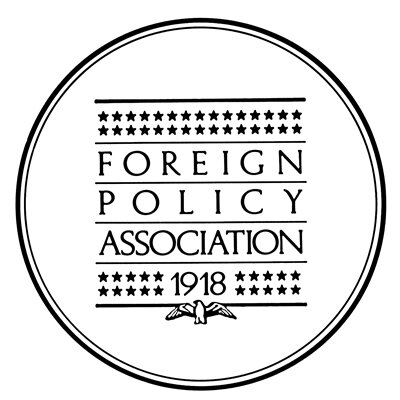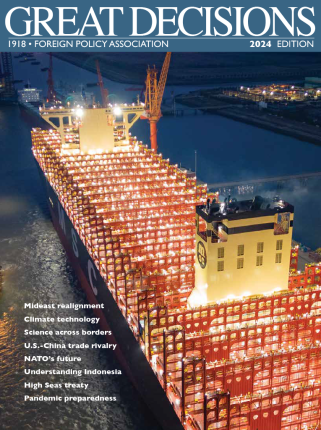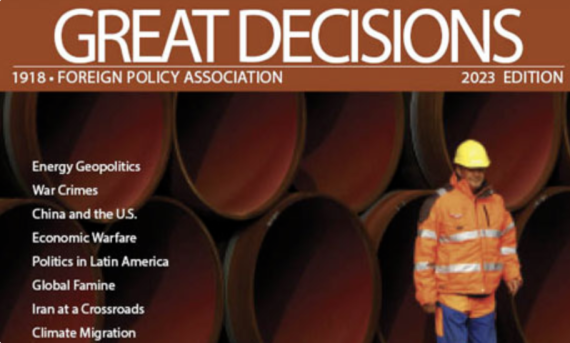AGSC partners with the Georgia Council for International Visitors (GCIV) who serves as the statewide coordinator for the Foreign Policy Association’s (FPA) Great Decisions program by helping facilitate discussion groups and lecture series that give participants the opportunity to expand their understanding of world affairs.
Topics change annually and are based on the Foreign Policy Association’s nonpartisan briefing book.
The 2025 Dunwoody Great Decisions Lecture Series will take place virtually every Thursday at 7:00 PM February 6 – March 27, 2025.
There is a fee to register for the virtual lecture series, and registration is required to receive the event link. Please see Registration details here.
Increase your awareness of global issues during this eight-week discussion series

2025 Great Decisions Topics
American Foreign Policy at a Crossroads
This chapter will explore the contours of the U.S. foreign policy debate as it plays out in a world of multiple and escalating crises and domestic polarization.
Author: G. John Ikenberry
U.S. Changing Leadership of the World Economy
Under President Biden, the U.S. has advanced new ideas about trade, technology, industrial policy, competition with China, and the organization of the world economy. For most of the postwar era, the U.S. has tied its global leadership to cooperative agendas aimed at creating a more open world trading system, but that has apparently come to an end. What are America’s options and opportunities as a leader of the world economy? How will America’s “foreign policy for the middle class” and strategic competition with China impact its leadership role? How can the postwar rules and institutions of the world economy be made safe for economic nationalism and great power competition?
Author: Daniel Drezner
U.S.-China Relations
Washington’s relations with Beijing have reached an ominous low ebb. Both American political parties have identified China as the country’s preeminent geopolitical challenger and, in the eyes of many, a systemic threat. What is driving this deterioration of Sino-American relations, and what are America’s strategic options in the face of Chinese power and ambition?
Author: Thomas J. Christensen
International Cooperation on Climate Change
The 2015 Paris Agreement established a UN-sponsored framework for negotiations on climate change and global warming. In subsequent COP meetings, experts and political leaders have come together seeking common cause for this growing global crisis. What is the future of these efforts, and what have they yielded? What is the U.S. role in fostering cooperation on climate change? In a divided country, what are the possible futures for American policy leadership?
Author: Josh Busby
The Future of NATO and European Security
European security is more uncertain than it has been for decades. Putin’s Russia has launched a war with Ukraine on its doorstep, and America’s uncertain role as leader of NATO and security provider has been called into question with the failure of Congress to pass supplemental military support for Ukraine. What are Europe’s options, and how might developments on both sides of Western Europe – in Ukraine and across the Atlantic – impact its choices? What are America’s stakes in NATO and Europe’s strategic dilemmas?
Author: Kori Schake
AI and American National Security
The AI revolution is the leading edge of a larger high-tech revolution which promises to transform the world. Experts argue that international cooperation is needed to expand the opportunities these new technologies hold while protecting societies from their dangers. What are the key policy debates in this area, and what are the opportunities and limits on global AI rules of the road? How will the AI revolution impact American national security? What are its policy options to secure the benefits of AI and guard against its dangers?
Author: Julie George
India: Between China, the West, and the Global South
India is an emerging major power in world affairs, occupying a pivotal position between China, the United States, and the Global South. Its population size, economy, and geopolitical location ensure that it will be an influential voice in debates and political struggles over global order. What are India’s choices and opportunities for regional and global leadership? How will it maneuver between China and the United States, and what is its role as a voice of the Global South? What opportunities exist for Washington to work with India?
Author: Leslie Vinjamuri
After Gaza: American Policy in the Middle East
The war in Gaza has brought the region to a crossroads. What are the possible outcomes of the war, and how might the United States use its influence to shape a long-term settlement that leaves both Israel and the Palestinians in a better position? How might Arab states in the wider region be brought into a settlement? What are America’s interests in the Middle East and how can it advance them?
Author: Daniel Kurtzer
2024 Great Decisions Topics
Mideast Realignment
The United States and Middle East are at a crossroads. In spite of a reduced presence in the Middle East, the U.S. still has significant national interests there and the area is a key arena for global power politics. Can the U.S. continue to defend its interests in the Middle East and globally with a lower level of military and political involvement, or should it recommit to a leading role in the region?
Climate Technology & Competition
Will the United States and China, with other powerful countries following suit, approach current and future climate initiatives with an increased commitment to trade protectionism and nationalism, by various measures including trade restrictions? Or could a growing spirit of international accord develop to confront the “common enemy” of climate change?
Science Across Borders
Scientific advances benefit from collaboration between researchers, but what happens when material, such as Artificial Intelligence (AI) is controversial and important to a nation’s national security? Is there a middle ground between sharing information and denying access? How can we regulate cooperation?
U.S.-China Trade Rivalry
China’s economic rise and its current policies of increasing the role of the state in the economy have led some U.S. policymakers to seek to deny China access to U.S. technology and investment. This is seen as a necessary corrective to decades of predatory Chinese economic policies. Is this a wise strategy, and how effective can it be?
NATO’s Future
Since the Russian invasion of Ukraine in February 2022, the North Atlantic Treaty Organization (NATO) has come under increased scrutiny, not because NATO troops are involved in the conflict, but because of its role in relations between Russia and its neighbors. Will expanding membership in NATO protect countries, or will it further provoke Russia?
Understanding Indonesia
Despite its large size, Indonesia remains virtually invisible to most Americans. But as one of the world’s largest democracies, the world’s largest Muslim-majority nation, and as an economic driver of ASEAN, why does it fly below the radar? What are current issues in U.S.-Indonesian relations, and what role can the country play in Asia?
High Seas Treaty
Areas of the seas beyond national jurisdiction comprise the high seas, which face a degradation of ecosystems due to climate change and the increase in human activities, such as shipping, overfishing, pollution, and deep-sea mining. The recently negotiated High Seas Treaty, also known as the Biodiversity Beyond National Jurisdiction treaty, will attempt to address these issues. How difficult will it be to convince nations to participate?
Pandemic Preparation
Looking back at the Covid-19 pandemic, there are many lessons to take away in terms of domestic and international policies. Although this pandemic seems to have waned, how can we apply these lessons to future pandemics? Will countries cooperate, and will a consensus emerge on how to manage global health challenges?
2023 Great Decisions Topics
The 2023 Dunwoody Great Decisions Lecture Series took place virtually every Thursday at 7:30 PM February 2 – March 23, 2023.
Energy Geopolitics
Access to oil and gas has long held an influence over the politics of individual nations and their relations with others. But as more countries move toward sustainable energy and supply chain shortages affect the availability of oil and gas, how will this change the way in which the United States interacts with the outside world?
War Crimes
Russia’s invasion of Ukraine has resulted in widespread charges of war crimes and calls for justice. But what exactly are war crimes? Opinions of what constitutes a war crime have evolved, as have ways to identify and punish the perpetrators. How will the war crimes committed in Ukraine be dealt with?
China and the U.S.
For the past ten years, the United States and China have been locked in a competition for who has the greatest global influence. One major point of contention is the status of Taiwanese sovereignty, which has become even more relevant recently with the possibility that Russia’s invasion of Ukraine may prompt China to take similar action regarding Taiwan. How will the United States engage a China which is increasingly seeking to expand its sphere of influence?
Economic Warfare
Waging economic warfare consists of a variety of measures from implementing sanctions to fomenting labor strikes. Such tools are utilized by states to hinder their enemies, and in the case of the United States have been used as far back as the early 19th century. Since Russia invaded Ukraine in February 2022, economic warfare has been the main means for the west to challenge Russia. How effective will these sanctions be at convincing Russia to cease its war?
Politics in Latin America
Electoral results in Latin America over the past four years have led many observers of the regional/political scene to discern a left-wing surge in the hemisphere, reminiscent of the so-called “Pink Tide” that swept the area some 20 years ago. But how much do these politicians actually have in common? What implication does their ascendency have for the region?
Global Famine
Fears of global food shortages have followed Russia’s invasion of Ukraine, which has disrupted grain shipments from the major grain producer. But what about countries and regions that were suffering before this impending shortage? How is famine defined, and how is it different from simple food shortages? What if any remedies are there?
Iran at a Crossroads
By the fall of 2022, Iran was in a state of turmoil due to widespread protests against government-enforced wearing of the hijab, a failing economy, an ineffective new president, and the looming succession of the country’s leader, Ayatollah Khamenei. Abroad, renewal of the Iran nuclear deal seemed doubtful and tensions remain high between Iran, Israel, and Arab states. Many Iranians have lost hope of a better future, and the country seems at a crossroads. How should the United States deal with it?
Climate Migration
As climate change accelerates and drought and rising sea levels become more common, millions of people in affected regions must uproot themselves and seek safety elsewhere. Who are these affected individuals, and how might the United States aid them, and be affected by the migration?





